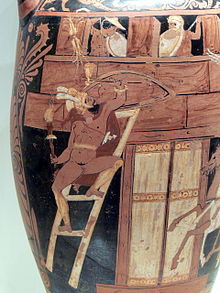Capaneus

Kapaneus ( Greek Καπανεύς ) was one of the seven heroes in the train against Thebes , son of Hipponoos . His mother is either an astynomial or a laodike . He is the father of Sthenelos .
Kapaneus besieged either the Ogygian Gate or the Elektra Gate. During the storming of the city, he boasted that he would bring down the walls of Thebes even against the will of Zeus and that he would even defy its lightning. But on the scaling ladder, the high-spirited Zeus met Blitz, a scene that was immortalized in sculptures and paintings. His wife Euadne or Janeira threw herself into the flames when he was put to the stake and allowed herself to be burned with him. At Stesichoros he is revived by Asklepios .
He is one of the marginal characters in the drama Antigone by Sophocles . It does not appear in the surviving fragments of the Theban epics.
In Delphi one of the existed Argives donated statue of Kapaneos.
Kapaneus also appears in Dante's Divine Comedy . In the third ring of the seventh circle of hell, he is punished there along with other blasphemers .
swell
- Sophocles Antigone 127ff.
- Euripides Phoenissae 1172ff.
- Euripides Supplices 860ff.
literature
- I. Krauskopf . In: Lexicon Iconographicum Mythologiae Classicae (LIMC). Volume V, Zurich / Munich 1990, pp. 952-963.
- Kurt Latte : Kapaneus 1. In: Paulys Realencyclopadie der classischen Antiquity Science (RE). Volume X, 2, Stuttgart 1919, column 1886 f.
- René Nünlist : Kapaneus. In: The New Pauly (DNP). Volume 6, Metzler, Stuttgart 1999, ISBN 3-476-01476-2 , column 256.
Web links
- Capaneus in the Greek Myth Index (English)
Individual evidence
- ↑ Hyginus Mythographus Fabulae 70. Scholion to Euripides Phoenissae 181. Scholion to Pindar Nemeen 9.30
- ↑ Scholion at Pindar Olympia 6.46. Libraries of Apollodorus 3,10,8.
- ↑ Bibliotheke of Apollodor 3,6,6. Aeschylus Seven against Thebes 423. Pausanias 9,8,3
- ↑ Bibliotheke of Apollodor 3,6,7. Ovid Metamorphoses 9,404
- ↑ Libraries of Apollodor 3, 7, 1. Flavius Philostratos Imagines 2.31. Ovid Ars amatoria 3.21. Hyginus Mythographus Fabulae 243
- ↑ Libraries of Apollodorus 3,10,3
- ↑ Pausanias 10:10, 2
- ↑ Dante Divine Comedy: Inferno 14 : 46-72. Translation of the early romantic poet Karl Friedrich Gottlob Wetzel (1818) see Kapaneus after Dante .